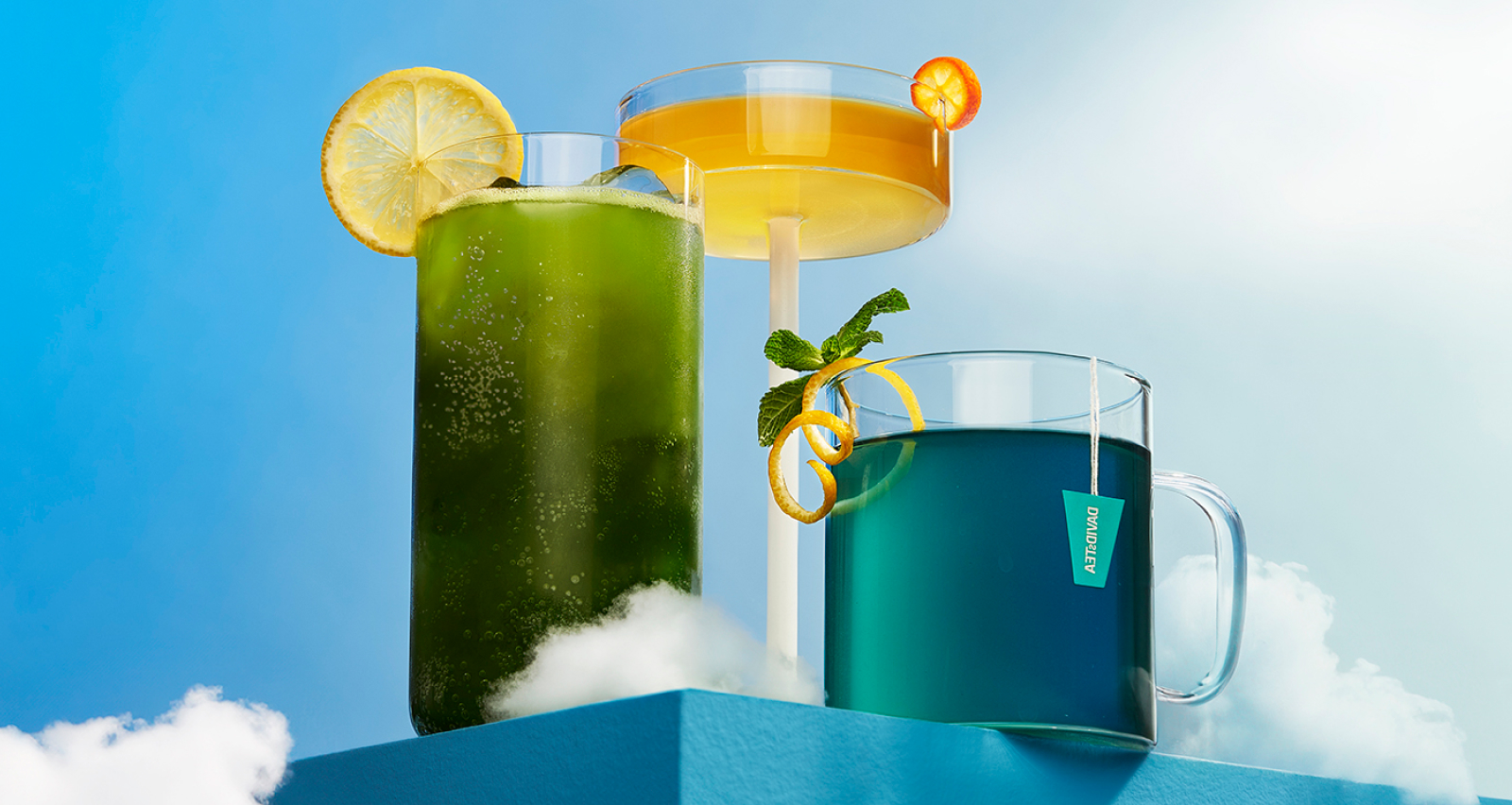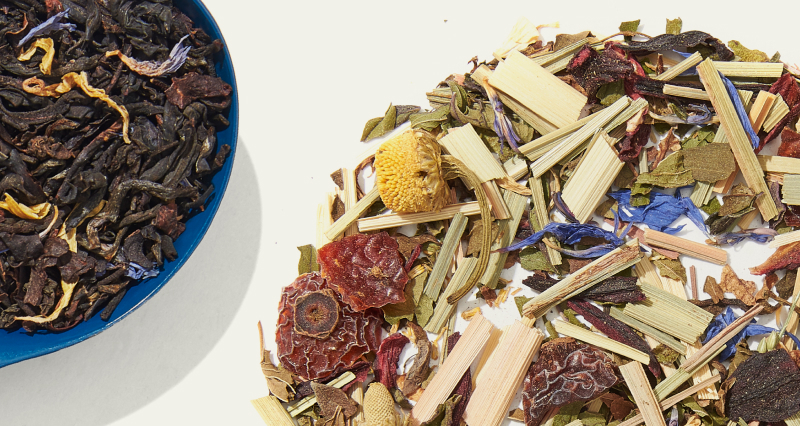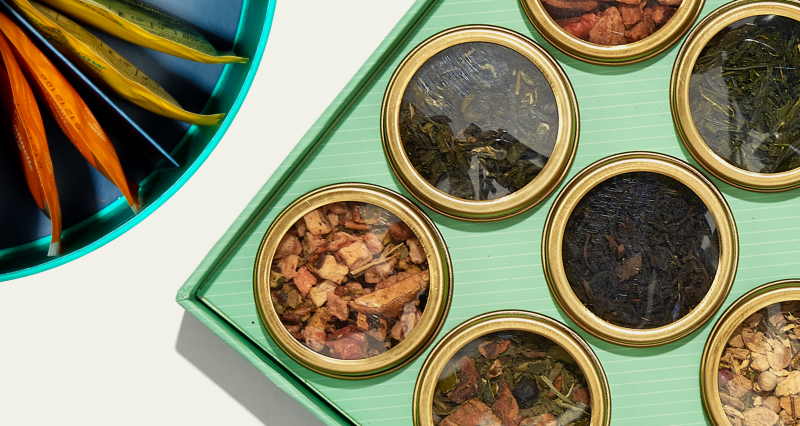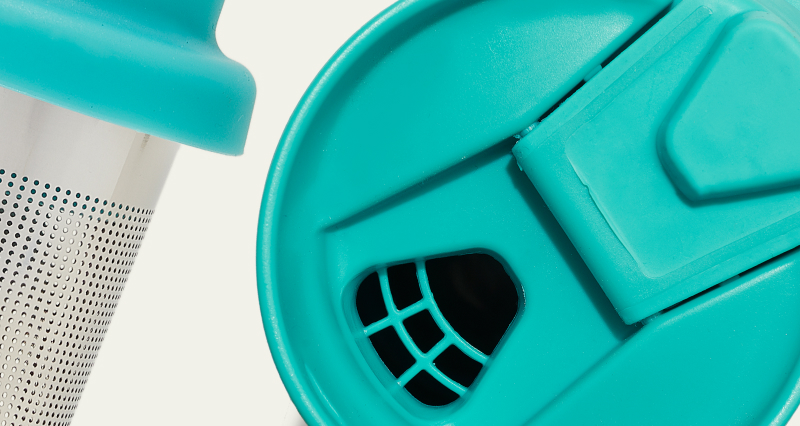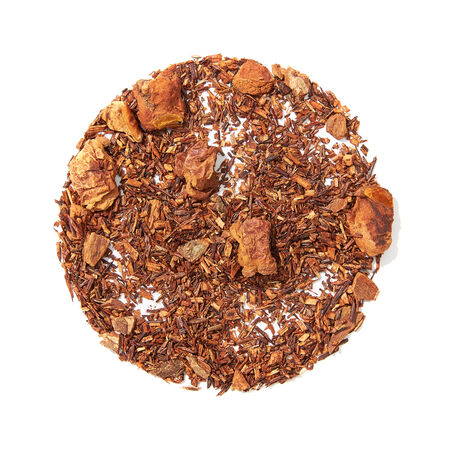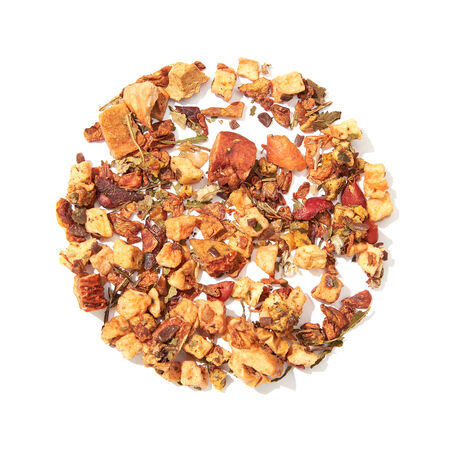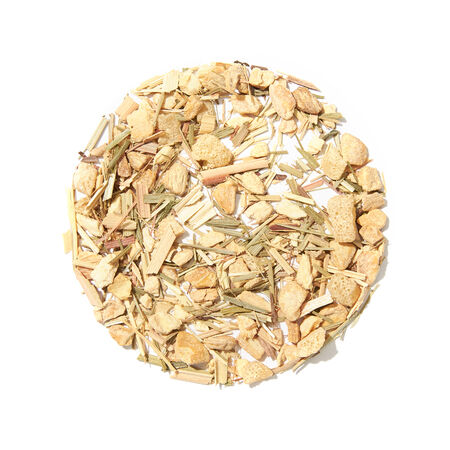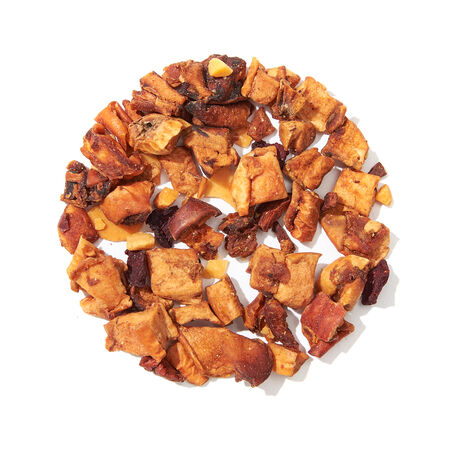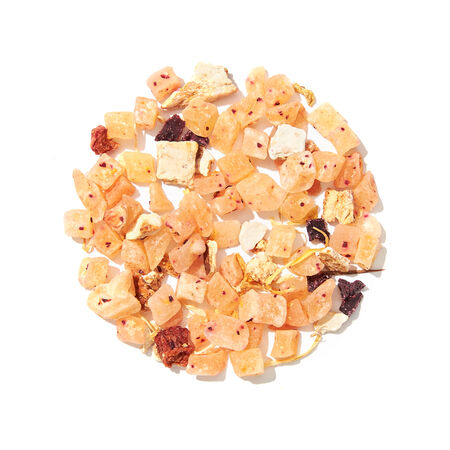season 2 | ep. 20
all about
sweeteners in tea
with Celia Aceae & Kelly Miller

steeping together podcast
- season 2 | Ep. 20
all about sweeteners in tea
with Celia Aceae & Kelly Miller
episode transcript
Marika de Vienne 0:18
Welcome, everyone to a special mini episode of Steeping Together, where we explore a specific topic within the vast world of tea with a tea enthusiast. I'm your tea-obsessed host Marika, and as usual, cannot wait to dive right into today's topic. I do not have a sweet tooth at all. It is for this reason I almost never sweetened my tea, and almost never sweetened anything, save for the rare occasion when I'm feeling sick. The thought of adding sugar, honey, agave or even maple syrup almost never comes up. But I do know that I am in the minority. Most certainly in North America, many people habitually add sweeteners to their teas or actively seek out teas that contain sweet ingredients, which from my perspective seems alien and odd. But no leaf in the tea world should be left unturned. This is why I have enlisted Celia Aceae and Kelly Miller to help me understand why sweeteners are… sweet! Either as an added ingredient to your already steeped up cup, or as an ingredient incorporated into a blended tea, these tea adventurers are here to enlighten me and help me discover the wonderful world of sweeteners. Welcome, ladies.
Celia Aceae
Thank you.
Kelly Miller 1:29
Thanks for having us.
Marika de Vienne 1:31
Such a delight. You've been here before. We can't deny or hide this. But would you care to just briefly introduce yourselves for any listeners who would have missed your previous appearances on the podcast?
Kelly Miller 1:42
Yeah, for sure. My name is Kelly. I'm the Research and Development Lead here at DAVIDsTEA for tea and products. And I'm also probably our office sweet tooth.
Celia Aceae 1:54
I'm Celia Aceae. I am the Tea, Herb and Sustainability Specialist, which basically just means that I am a plant person. I just love plants, I think about plants all day. And generally I'm thinking about plants that have functions. But contrary to popular belief, I do still add some sweetness to some of my teas depending on how I'm steeping.
Marika de Vienne 2:15
Excellent. That's exactly why I've asked both of you to be here because, sweetness and tea–when we say tea in this sense, I'm really just talking about Camellia sinensis right, and habitually with like traditional teas, the response to adding any kind of sweetener to that tea is not always great, right? We want to try and taste the tea as it was intended. Don't alter it, you know, it’s perfect as is. And when it comes to teas that are blended or herbal teas, we try to, at least at DAVIDsTEA, we try to create a tea where you wouldn't necessarily have to add anything to it. It's already got a very complete flavour profile. But there are millions of people adding sweeteners to teas, and we have lots of blends that have sweet ingredients in them. So I just want to understand, why? Not, do you like it, do you not like it? You know, that's a personal taste thing. And we're not here to tell people how they should take their tea. Hey, you like putting three spoonfuls of white sugar into your black tea? Have at it, go for it. But just from a flavour perspective, like why would you add sweetness to a tea?
Kelly Miller 3:22
I mean, the most obvious one is truly you like it, and that is down to personal taste. But there are a lot of layers. I think when we talk about adding sweetener after you've already steeped your tea, a really obvious one can be course correction. We don't always sleep the perfect cup of tea. Statistically, it's just not going to happen every single time. And that can often result in teas that are really bitter. And sweetener is a flavour balancer, it can really soften some of that roughness. And if you're not someone who wants, you know, a black cup of coffee every day or a really bitter cup of black tea, then it can really resolve a world of hurt.
Marika de Vienne 4:09
Yeah, and I like how you use the word balance there for it because it's not necessarily about making the tea sweet. It's about kind of mitigating or reducing any bitterness that you would have had in oversteeping. I mean, Celia, do you agree?
Celia
Absolutely.
Marika
Okay, I’m not totally out in the field here.
Celia Aceae 4:29
Yeah, and I think from a from a functional perspective, generally, you know, people are like, Well, what tea is the best for me to drink? What is the healthiest? And the honest answer is, you know tea has benefits. We know this to be true. It's a very functional ingredient. It was considered one of those like original health beverages. We drink it because we love the flavour but if you are kind of coming at it from that direction, if you're adding something sweet to it, and you're drinking more because of that, then that's the right answer. Like you should be enjoying what you drink, if that means adding some sugar, adding some maple syrup or whatever that looks like for you, and that means that you're going to drink more, then go for it, I say!
Marika de Vienne 5:11
I mean, we're definitely three people in this room who are going to encourage people to drink more tea, like do whatever you need to do to drink more tea.
Celia
Absolutely.
Marika
But it's true that from like, I mean, we're not doctors, but from a health perspective, if you're incorporating more functional ingredients, tea included in that list of ingredients, you can't just have one cup a week and expect to see any kind of change within your system. The tea would go through your body much too quickly. So you have to kind of drink it more often in order to benefit from it. And we all know that you’ll only drink it more often, if you're enjoying the experience. I mean, there are some people out there who are a lot more, shall I say rigorous than I am, and who will probably subject themselves to things that they don't necessarily like in the goal of wellness. But if you like it, you'll probably enjoy it a lot more, and you'll probably drink it a lot more.
Celia Aceae 6:05
Yeah and to your point, I don't necessarily drink a lot of straight teas or traditional teas with sugar or with any sweetener, because I do really like to enjoy the flavour of the tea itself. I'm choosing a tea that speaks that way, even in, I don't even think about it in terms of course correction very often, but I almost always add sugar when I'm making an iced tea, a TeaPop or a latte because I just find that it balances a little bit better. Especially for TeaPops or lattes if you have milk or if you have that carbonation, the sweetener can kind of help balance it. If you have an iced tea, it can just help enhance the flavours naturally. And it just kind of comes out a little bit more. And so I just think that when I'm making a drink like that it is often more like a fun beverage, you know. So that's where I'm adding some sugar.
Kelly Miller 6:54
I kind of want to piggyback off that with the iced tea in particular, because when you're drinking something cold, it's a lot harder to perceive flavour. Much, much harder than if you're smelling something that's hot or drinking a hot beverage. So it does kind of lean into one of the many reasons that we use sweet ingredients in blending but even after the fact sugar, sweetener, honey, whatever your go-to is, is a flavour enhancer. It brings out flavour and so when you're drinking something cold, then adding sweetener can make a more muted flavour pop more.
Celia Aceae 7:31
Absolutely.
Marika de Vienne 7:32
It's just so amazing how every time I have a conversation with you ladies, I think of eight other conversations I want to have, like Kelly you just said like the way you will perceive flavour in hot versus cold teas is so different and it's true, but I've never thought of it in such a concise sentence and I'm like, Oh, I have another episode idea. Like I want to dive into that! But it's true that when I have an iced tea beyond wanting to add that sweetness for like the fun aspect of it, which is undeniable and very, very true. The flavour of certain components within that iced tea are going to be more vibrant and present once you've added a sweetener. Okay, I'm very happy that we've established that sweet doesn't mean dessert and sweet doesn't mean sickly sweet or overwhelming. It's a question of balance. It's a question of incorporation to your taste. And to that point, let's talk about the two different types of sweeteners that we have in tea, the ones that were added after and the ones that are incorporated in, and which are your favourites? Because it's a question of like, it's a question of personal taste. Kelly, favourite sweetener to add in your tea after it's been steeped?
Kelly Miller 8:45
So my personal favourite is honey. You've actually seen this in person, but I have a pretty substantial–we'll call it a honey collection.
Marika de Vienne 8:53
Absolutely.
Kelly Miller 8:54
I am fascinated by how, similar to tea, honey has its own flavour affected by processing and terroir. So the range you can get of flavours really really appeals to me. So when I add honey it's usually to add an additional flavour. Not necessarily to enhance a flavour or correct although of course I do those things sometimes too. But I like to pull out a buckwheat honey, which has a lot more of a dark brown kind of caramelized note, if I'm making a chai, for example. Or I might pull out a linden honey or something a lot more softer and floral for a white tea or something with more delicate notes. And it's always to add a flavour, kind of twist something in a way and just have that extra step of control and innovation and fun.
Marika de Vienne 9:46
I love that because I feel like honey people and tea people have a lot of overlap in their interests and that terroir and that particular flavour that honey will bring beyond just the flavour, like when I say honey like everyone has a taste memory in their mind of what that tastes like. But in the world of honey, the flavours are so distinct and unusual that you are really adding a different component to that, which is why I use it very seldomly, because I feel completely inequipped to choose the correct honey. I'm always like, I'm going to change the flavour of my tea, I don't know if I want to do that, so…
Kelly Miller 10:22
There's no correct or incorrect, though, only experimentation. And you won't know until after the fact whether or not it was a good fit. I have a honey at home that I'm obsessed with currently, that's made from the blossoms of carrots. So it's a carrot honey imported from France. It's like the fanciest honey I own, and it has a surprisingly earthy and sour flavour to it. So it's really really unique and I love it and I've tried it with a million different teas and maybe 5% of them have been good fits. But the challenge of finding the perfect thing to add that particular kind of sweetness to has been really really fun.
Marika de Vienne 11:07
Ah, it’s all about the adventure. Thank you for freeing me from that concept that I need to make a perfect cup of tea every time. Because I will–I gotta let go of that. I've got to let go of that.
Celia Aceae 11:16
Yeah, I think I think that it's different as well if you're like Kelly and you have so many different honeys to choose from, you can choose the right fit, but if you are maybe someone who just has one type of honey at home and you haven't experienced all those different flavours you might have one concept of what honey tastes like. And what that is like with your other teas or with different teas. I think I have like three honeys at home and even those honeys I make very specific choices when I'm making tea. That's a very specific thing.
Marika de Vienne 11:45
Alright, Celia favourite sweetener after steeping?
Celia Aceae 11:49
So, as we were talking, I was thinking about what sweeteners I have at home and I realised that I have lived in the current home that I live in for four or five months, I have actually not bought sugar. I don't own sugar. So that is off the list completely. And I guess it's just not something that I even think about or that I use. My go-to is generally maple syrup.
Marika de Vienne 12:12
Okay, talk about a sweetener that has its own distinct flavour!
Celia Aceae 12:16
It really does. But my other options are, like I said I have about three honeys at home. One that's very gentle, one we actually had a hive of, like a beehive in our garage wall. So we call it the “wall honey.” And that was really fun because whenever the house would get hot with the sun, you know, the honey would melt a little bit which is so wild. It sounds like it's from a fairy tale honestly. But eventually we had to harvest that honey and relocate the hive or the colony. And when we did that we got a lot of honey out of it, but it's so strong, it's a very strong flavour. So when I'm using “wall honey,” it really has to be paired with a really intense black tea usually or something like that. And I'm doing it for a specific purpose. Otherwise, my maple syrup is more gentle than that. So by comparison in terms of sweeteners, what do I have? The maple syrup is probably the gentlest of what I use. I'm trying to think of like what else I might use, but those are really the main two. I actually do love licorice root and I actually have licorice root on the side. And sometimes I will put like a little bit of licorice root in my tea while I'm steeping it almost as a sweetener.
Marika de Vienne 13:29
But to me that is an ingredient that you’re incorporating into the blend.
Celia
It is an ingredient, so that’s completely different.
Marika
I'm gonna have to stop you there before we go into that, not because it's not interesting but because “wall honey,” Celia. When you were talking about honey at home, you like–let's unpack this for a second here. You literally had–your home was producing honey. Almost like an episode of like Stranger Things, or something, like honey leaking from the walls.
Celia Aceae 13:58
Well, my grandfather had, well he had many hives, probably about 20 hives, I would say when we were growing up, and so we harvested a lot of honey. We still have buckets and buckets of honey from that. So that's my preferred honey. And then I also harvested honey in BC when I was living there. So I have my own honey from Sorrento that I love as well. And those are like my choices of honeys that I usually go between. But yes, I did have honey leaking from my garage wall.
Marika de Vienne 14:26
And yet you still, you have access to, I'm imagining buckets and buckets of honey here. That you know is like natural and home honey really. And you're still choosing maple syrup, which as we said is such a, you know, a sweetener that will change the profile of your tea. So my question is, well why?
Celia Aceae 14:47
Well I think the honeys are so intense that they change it more. Maple syrup does have a bit of a dense flavour. We do also have maple trees on our land, so we do tap our maple trees.
Marika
Of course you do.
Celia
Of course!
Marika de Vienne 14:58
For anybody who's listened to Celia on the podcast before, none of us are surprised that any of this is happening. And I just, I want to taste your wall honey and I want to taste your maple syrup that you tapped yourself. The thing that I'm taking away from both of your answers, be it like the imported carrot honey, or the or the maple sap on the woodstove. It's really making me think, A–not everyone has access to the very particular types of sweeteners that you both are outlining here. But it is really important to know your sweetener, right?
Kelly Miller 15:33
I would agree. But thank you for checking our sweetener privilege, because you're right. We are both total foodies in pretty different ways. But we're talking about things that maybe are not 100% relatable. And you know, to that note, there is nothing wrong with your regular old cane sugar, that's still the most consumed kind of sweetener in North America and that's true for a reason. Yeah, it's a great pretty neutral sweetener, not the most neutral. But definitely, like very low. Really, really familiar. And it's something most people grow up with. So when you're talking about sweetener, for course correction, or flavour enhancement or whatever thing on the sweetener bucket list you're trying to check off. That's one that I think is just really approachable and familiar for almost all people in North America.
Marika de Vienne 16:24
I'd have to agree. I think when you get a tea service at someone's house, you know, when you have like the creamer and the sugar bowl and everything, it's those white cubes of sugar. That is just the sweetener that as North Americans we understand the most. And it's the easiest for us to dose on a dime, you know, to decide in that moment exactly how many cubes of sugar you want. So it does go back to, know your sweetener. Know what you want out of your sweetener before just willy-nilly throwing anything in your cup.
Celia Aceae 16:56
And I guess that that has a lot to do with just familiarity and branching out, like you're very familiar with your honeys. I'm very familiar with the maple, because it's something that we actually harvest. And I think that, yeah that was a really good check. And I think it is just like being about becoming familiar with what you have access to.
Marika de Vienne 17:16
I wasn't really trying to check anyone, I was just really trying, I was thinking about myself where I don't add sweetener to my teas. But when I do on occasion, I use agave. And now I'm understanding by comparison through what you were saying. I was like, Oh, I understand something better about myself. Which is I'm using agave because it doesn't have a particular flavour profile that over-dominates in a tea, which is why I feel more comfortable using it because I don't know, it's just familiarity. It's comfort. It's not too thick, right? Agave is just really liquid and easy to incorporate into your tea. So yeah, I wasn't trying to like check anyone!
Celia Aceae 18:00
No I think it was really good, like how many people do have access? And like I grew up in Alberta, where we like originally, where you don't really have maple trees. And that, you know, there are other plants that might produce some form of sweetness. But it wasn't until I moved to Ontario that I even had access to that. And that's something that's really important to acknowledge is that a lot of Canadians don't have maple syrup or maple trees that are just accessible. It’s on our flag but it's not a plant that grows everywhere across the country.
Marika
It doesn't?
Celia
It does not. A lot of my friends have never seen a maple tree.
Kelly Miller 18:31
Same in Saskatchewan. It was not common at all to see sugar maples.
Celia
A sugar maple.
Marika de Vienne 18:35
Oh a sugar maple. Okay all right.
Celia Aceae 18:37
We do have like Manitoba maples. They're very common.
Marika de Vienne 18:40
You almost sent me down an internet rabbit hole. I was like, we don't have maples everywhere? Okay, before we started another episode on maple syrup.
Celia Aceae 18:49
I have a question first. I'm really curious. What were you thinking of when you said, you know, table sugar is not the most neutral of sugars. What were you thinking of?
Kelly Miller 18:58
Agave is the one that I was definitely thinking of. And there's a reason why it's this default sweetener in our stores as well because it's the most neutral, it's definitely accessible in that way. And we like it at least when we’re making in store beverages. Although we carry other sweeteners, this is our preferred because it lets you just taste a more enhanced version of the tea without changing the flavour too drastically.
Celia Aceae 19:23
I think that's really interesting because I have had some agaves that are very strong that have their own flavour, and that I've really disliked and that actually almost turned me off of agave for a while. And it wasn't until I started using the ones in our stores that I was like, Oh, this is a very neutral flavour and I can use this as a neutral flavour enhancer for my teas. But I think that if you're coming at it and you are hearing this and you're like, Okay, I'm gonna go try agave because it sounds neutral, to be aware that not every agave is neutral and it's just like honey, it's just like maple syrup, like finding the flavour or the grade or, you know, the type that works best and becoming familiar with that as well.
Marika de Vienne 20:02
It's just such a huge world. I mean, we've only touched on a few of the sweeteners, we haven't gotten into, you know, anything too granular and already there's so much to discover. Okay, we got to keep this to a mini episode. We can't let this run away like the caffeine episode! But I want to talk about ingredients that they themselves are sweet that are incorporated in to blends. Now, we’ve talked about licorice in a previous episode, how it's one of our favourite, I mean, at least me and Celia, I don't know how you feel about it Kelly.
Kelly Miller 20:33
Not a licorice root fan. Won't unpack that. Not at least on the podcast. We’ll unpack that privately.
Marika de Vienne 20:43
Thank God we work together because I have so many questions later on. But there are other ingredients that we use, particularly in our teas. We've decided not to discuss stevia today, we want to dedicate an entire episode to stevia because it's a fascinating natural ingredient that is really really polarizing and we really want to take the time to discuss that on its own. So other sweeteners that we have in our tea, we have sweet blackberry leaves, we have licorice as mentioned, we have monk's fruit, am I forgetting anything?
Kelly Miller 21:16
I think apple is one that is not normally considered a sweet ingredient but is definitely utilized that way.
Celia Aceae 21:23
Beetroot to me is the big one that stands out. I lived in southern Alberta for a long time, and that's really one of the major producers of beetroot that is used for you know, like Roger's Table Sugar. And I think that people often disassociate table sugar from being a plant or like what that looks like. But the fact that it's, you know, it's beets that are harvested and turned into sugar, or sugar cane that's harvested and turned into sugar, but we use a lot of beetroot because it is naturally so sweet in our blends, and it offers colour, like a really nice deep red colour. And so that's the one that I think of as being like a gentle sweetness.
Marika de Vienne 22:01
Okay so if we have the opportunity to add sweetness to our tea post-steep, walk me through the logic of using sweet ingredients in a blend. Now, I already said that here at DAVIDsTEA we try to create teas that stand on their own, that you steep and it's ready to go. But not factoring that into the thinking, like what are the other reasons why you would add a sweet ingredient to a blend?
Kelly Miller 22:28
I think it really depends on the ingredient and the blend as individual things, because we look at things like apple or beetroot or sweet blackberry leaf as just part of a blending toolkit essentially, where they each offer their own pros and their own cons. So apple as an example, kind of has this bell curve, if you will, of where it offers neutral, slightly fruity sweetness to when it just tastes like apple juice. So we use it a lot in very fruit forward blends, because you can kind of hide that apple-y taste but use it in a large enough percentage to naturally lift and add a bright kind of sweetness to those teas. But I wouldn't use apple, at least for sweetening purposes, in a blend that say is, I don't know cinnamon flavoured or something minty, for example. Apple would be the wrong sweetener choice if you're making a really mint forward blend, because it's going to add an almost cacophonous sort of brightness that won't really blend very well. And if you use a large percentage of it, it will eventually start to taste like apple because it is apple.
Marika de Vienne 23:43
Just, that's really interesting, because you just said you wouldn't necessarily use apple when you're trying to make like a cinnamon forward tea. If you're trying to make like a–because apple and cinnamon go together like peas and carrots. But you're talking about a different profile there, right?
Kelly Miller 23:58
And not a cinnamon apple but just like a pure cinnamon. If you want the focus to be exclusively cinnamon, apple’s not going to be a good fit because it's not going to blend seamlessly and the flavour won't hide if that makes sense.
Marika de Vienne 24:13
I don't always think of apple as a sweet ingredient really. But it's true that I'm thinking of a lot of our blends that have that sweetness, or you want the other flavours to come out without it tasting like apple juice. It's a complicated ingredient, and we have it in a lot of our teas and it's because it just works so well with so many different ingredients, right?
Kelly Miller 24:34
Yeah, absolutely. I mean we carry a lot of fruity teas. It's not a secret. We love fruit, fruit is great. And ergo we have a lot of teas with apple.
Marika de Vienne 24:45
That makes sense. Celia I know you must have something to say about sweet blackberry leaf and monk fruit, and all of those sweeteners. Why would you add those as opposed to apple, say?
Celia Aceae 24:58
Yeah, all right. So I think that just like in adding sweetener after, adding sweetener before everything has its own flavour. And that is even more enhanced or visible in some ways when you're adding it to the blend because you're not giving the customer a choice about it. So you have to be really careful that it blends really cohesively. Sometimes you have to think about, you know, the function of blending a functional blend, why not use a sweetener that has function to it. And this is actually really interesting because a lot of teas or a lot of sweet ingredients are also functional. So we talked about licorice root is the obvious one, using for like sore throats, upset stomachs. Interestingly enough, sweet blackberry leaf was also used originally for like digestive upsets and things like that. And monk fruit is another one. We don't talk about it too too much. But it's actually a plant in the cucumber family, you can think of it kind of like a melon, a small gourd, like in the visual. And it was used in traditional Chinese medicine originally for like sore throats and things like that, and we use it for sweetness. So I think of something like licorice root as being a very intense flavour, so we do have to use it in very small doses if we are going to be adding that, whereas monk fruit I find has like a very, like round flavour to it. And when I really like it in blends with cinnamon or things like that, whereas sweet blackberry leaf I often like it in slightly fruitier things. I find it has like this really high note to it, when it comes out. And just the difference in the blending can really enhance the flavour or detract from it. So we really think about that. But then we're also thinking about, from my perspective I'm always thinking about the benefits and how that plays into the tea as well. And I think it's kind of fun that, you know, you're drinking something that's fun and sweet and maybe fruity, or fun and sweet and cinnamony. And it actually has a little bit of a benefit too. And I love that.
Marika de Vienne 26:56
Oh, for sure. And I think, the issue I think I have a lot when I'm in North America is that so many of our foods and other beverages contain so much sugar, so much sweetness, that I, at least when I'm drinking my tea, that's kind of the one place where I don't want that much. Not even from a health perspective, just from a flavour differentiator, I don't always want something sweet. But here, what I like about what you're both discussing is how sweet isn't bad, sweet in moderation can actually be an enhancer or have a functional benefit. It can be pleasurable, and is part of the flavour pantheon that humans crave. I mean, we need sweetness. I mean, we really do. If in its purest form, it gives you energy, right, just like honey and maple syrup, and all these things that give you basic energy. And then now you're saying also from a functional perspective, you also have like a wellness benefit that you'll get from these ingredients. So I think you've both kind of changed my opinion about adding sweetness to tea, because I think for a long time, I was just like, No, I don't, I don't, I don't do sweeteners, you know, I don't do that. It's not a flavour that I particularly enjoy. I don't seek sweetness, but a little bit here and there can actually enhance my tea drinking experience, which as everyone well knows, I am here for!
Celia Aceae 28:25
You're a flavour enthusiast, we’re flavour enthusiasts. That's why we love the sugar, the sweetness, all the varieties of it. I think you're gonna get really into it.
Marika de Vienne 28:33
I'm gonna get sweet, I'm gonna get sweet.
Kelly Miller 28:35
I want to touch on something you said though about, you know, we have so much sugar in the rest of our lives that we don't necessarily need sugar or sweetened tea. I think there is a misconception that when we use things like monk fruit, for example, in blends that there's so much of it in that blend. And for example, when we have teas with monk fruit in them, it's usually less than 1% of monk fruit that makes the final composition of the blend as dry leaf. And then when you steep that it's even less than that in your finished cup. So yes, it is adding a flavour and it's doing a lot to support the blend as a whole. But it's really such a micro part of the final composition.
Celia Aceae 29:19
And that's a really good point because we're working with like a natural plant. And this plant is considered to be 250 times sweeter than sugar. So licorice root we say is 50 times sweeter than sugar, monk fruit 250 times. And sometimes that scale, depending on the research that you're reading is changing a little bit, but that's where it's at, in that area. And that's a lot to think about, you know, so we're taking something that's already so many times sweeter than sugar and then we're using it in a blend rather than after, and we're seeing that difference immediately. And that's a really, really good point.
Marika de Vienne 29:53
That’s an excellent point because I think we don't–I don't want to bucket everyone under the same umbrella but I think that we don't give a enough credit to the potency of flavour found in the natural world. Like less than 1% in a blend, that's nothing, it could barely show up in your spoon when you scoop it out, but it's just so naturally powerful that you know it gives the misconception that we've just made half the blend monk fruit, you know! But I can't blame anyone for thinking that but it's a really good point to bring up.
Celia Aceae 30:28
Plants are powerful, plants are phenomenal.
Marika de Vienne 30:32
Plants are the best, plants are the best. Well, I cannot thank you enough for being our guests today. Because I think you've given me, I want to say a lot of food for thought. I'm trying to make a sweet pun here. I can't think of one right now.
Kelly Miller 30:46
A spoonful of sugar to help the thoughts go down.
Marika de Vienne 30:51
Oh, oh! I just want to end it on that. Thank you so much Kelly and Celia, and thank you for listening to today's episode. If you have any comments, questions or topics for another mini episode, you can reach us at steeping.together@davidstea.com or through our website davidstea.com. Have a great week. Happy steeping everyone.
celia aceae

about the guest
Celia’s obsession with tea began as soon as she could sip. Motivated by her love of plants (and insatiable curiosity), Celia studied conservation and natural resource compliance at Lethbridge College in Alberta. She went on to obtain a Red Seal in horticulture from the Niagara Parks School of Horticulture, and currently works as a Tea, Herb & Sustainability Specialist at DAVIDsTEA. But we’re not done yet! Celia has also completed an additional bachelor’s degree of Science in Horticulture, basically proving that her love of tea and plants is no passing fancy. With an encyclopedic knowledge of plants and their various impacts on individuals as well as the planet, Celia has committed most of her time to the proliferation of tea and plant knowledge. As a trained Tea Sommelier, she brings joy to those around her by sharing a cup of tea with anyone and everyone, at any time. Fun fact: she lived in Japan for three months studying matcha production and the Japanese tea ceremony, so quiz her, she loves it!
kelly miller

about the guest
Kelly Miller has been tea obsessed for nearly a decade. What is the source of her obsession, you ask? It all started when Kelly visited a DAVIDsTEA store for the first time to buy a gift for a friend. Intrigued by our Birthday Cake tea, she gave it a quick sip. And just like that Kelly, the tea sommelier, was born. THAC (Tea and Herbal Association of Canada) Certified, Kelly currently works as the Research & Development Lead at the DAVIDsTEA headquarters. Her generous and exploratory nature makes her an indispensable member of the team as she continuously pushes for new flavour innovations. Since her first introduction to the world of tea, she has tried over 10,000 teas AND her personal collection exceeds 1,500 unique teas and blends!






